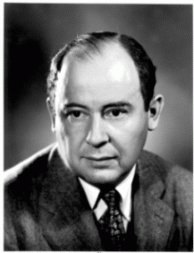|
| ||
|
| ||
Who was John von Neumann?
Similarly to Charles Babbage, John was the son of a wealthy banker whose private tutors quickly noticed that he was a child prodigy with unmatched aptitude for languages, mathematics and the natural sciences. At the age of 22 John completed simultaneously two doctorate degrees: one in Mathematics from Budapest, and another one in Chemical Engineering from a university in Zurich, Switzerland. After teaching at the Berlin University between 1926 and 1930, von Neumann emigrated to the United States. There he became a professor in Mathematics, at first at Princeton, and later at the Institude for Advanced Study, where he remained until his death in 1957. John von Neumann was a rare genius who made major contributions to a vast range of fields such as set theory, functional analysis, quantum mechanics, ergodic theory, continuous geometry, economics and game theory, computer science, numerical analysis, hydrodynamics (of explosions), and statistics, as well as many other mathematical fields. While his two most influential books Theory of Games and Economic Behavior John von Neumann was an adviser to several American presidents and other political and business leaders. He was also a frequent consultant for the Central Intelligence Agency, the United States Army, the RAND Corporation, Standard Oil, IBM, and others. John designed the so called von Neumann architecture which is in essence the core design behind all contemporary digital computers.
His last book, published after his death, was called The Computer and the Brain
John von Neumann and the Technological Singularity
John Von Neumann famously said that "Life is a process which may be abstracted from other media." He was also quoted as saying that "the ever accelerating progress of technology ... gives the appearance of approaching some essential singularity in the history of the race beyond which human affairs, as we know them, could not continue." His definition of the Singularity was that the Singularity is the moment beyond which "technological progress will become incomprehensively rapid and complicated." Do you want to sumbit your own singularity content?Do you agree or disagree with the content of this page? Do you want to improve it? Do you want to post some great singularity content of your own? Why not share it here at Singularity Symposium?! |
|
|
|
| ||
Quality content
| ||
|
Copyright © 2012 - www.SingularitySymposium.com - All Rights Reserved
| ||
 John von Neumann was born on December 28, 1903 in Budapest, the Astro-Hungarian Empire.
John von Neumann was born on December 28, 1903 in Budapest, the Astro-Hungarian Empire.



